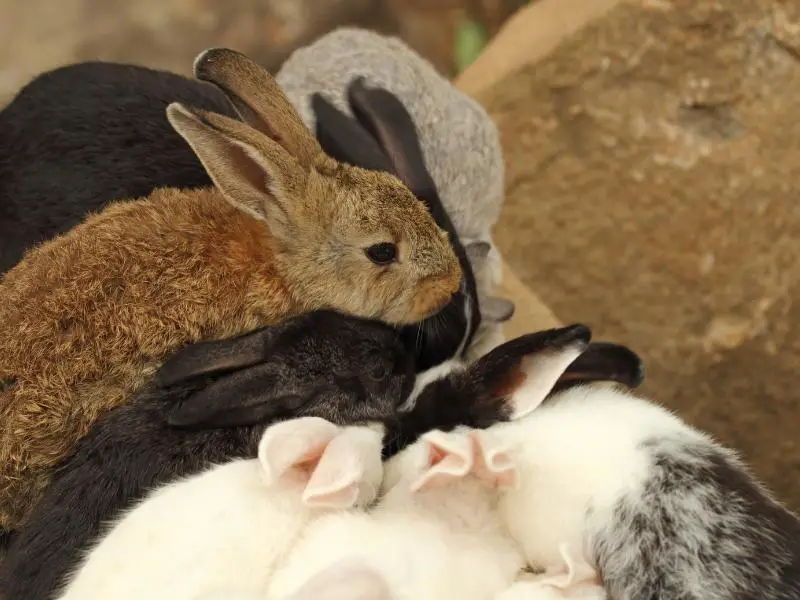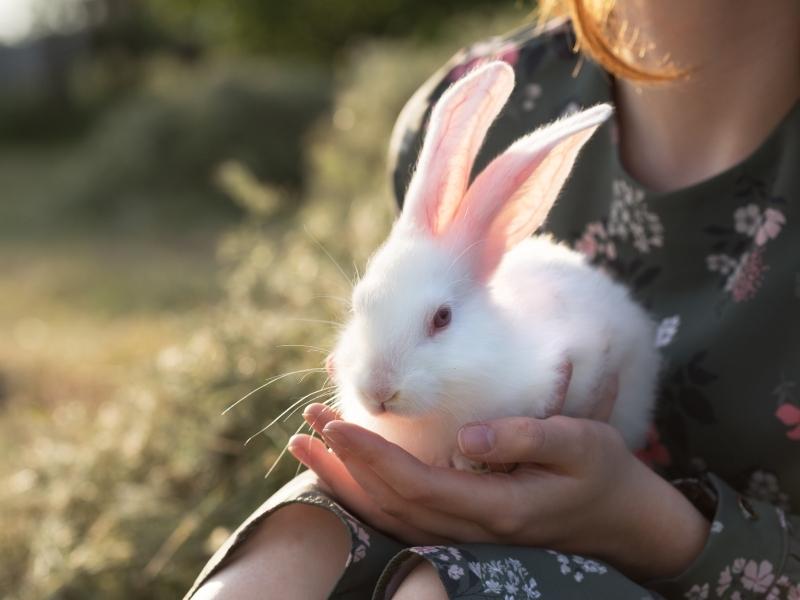One of the first things rabbit owners notice when they become bunny parents is the large number of poops that these cute and fluffy animals can produce. With all these poop balls lying around, surely there will be an awful smell that follows, right?
So does rabbit poop smell?
A healthy rabbit has two types of droppings: fecal pellets, which don’t have a smell, as it’s odorless to humans, and cecotropes, which are nutrient-rich droppings that rabbits eat for their nutritional benefits. Unfortunately, cecotropes can be pretty smelly if they are squashed.
Want to know more about rabbit poop and what to do if you notice a bad poop smell? We’ve got all the information you need right here in this guide.
Why Does Rabbit Poop Smell So Bad?
Let’s take a closer look at why your rabbit’s feces might smell bad:
Cecal Dysbiosis
Cecal dysbiosis is common in pet rabbits and occurs when there is a disruption to the delicate balance of organisms found in your bun’s digestive tract.
The cecotropes (which have a more pungent smell than normal rabbit droppings, which are odorless to you) don’t form properly. The result is a dark, mushy substance that looks similar to cow patties and has an awful smell.
Diets that are high in sugar and low in fiber can cause this condition, as well as:
- Obesity
- Infections in the respiratory tract
- Dental issues
Diarrhea in Rabbits
Although rare, diarrhea in rabbits can be fatal and requires immediate veterinary attention. If your bun develops diarrhea, the soft and mushy droppings can stick to their fur and cause a terrible smell.
A few signs that your bun has diarrhea include:
- Loss of appetite
- Lethargic
- Watery and formless feces
- Weight loss
Poopy Butt
This condition occurs when your floppy-eared friend cannot keep their backside clean.
Poop will collect on their butts, and the longer it’s left, the more extensive the collection of poop will become. This condition can cause a terrible smell, and it’s not pleasant for your bun.
You should make sure that your rabbit’s butt is clean, as a build-up of poop can attract flies, which can be deadly for your rabbit if the flies lay their eggs on them. This is called flystrike.
What Is Healthy Rabbit Poop?

Healthy rabbit poop (or fecal pellets) can vary depending on the breed of your bunny and their diet. Cleaning your bun’s litter box daily will also help decipher between what is healthy and abnormal when it comes to their poop.
Let’s take a closer look at what healthy rabbit poop should look like:
Poop Size
Healthy rabbit poop varies from the size of a pea to a chickpea (approximately 7 mm or a bit bigger than ¼ of an inch to 12 mm or almost ½ an inch) and should be the same size consistently.
Deer poop is often confused for rabbit droppings, as they have a similar poop shape.
If you notice a drastic change in the size of your bun’s poop (such as tiny rabbit poop when your rabbit’s poop is normally ½ an inch in size), you should take your bunny to the vet to make sure there are no blockages in your bun’s gut.
Poop Shape
Your bun’s poop should be the same size and look like small round balls. During shedding season, you may notice some minor changes in the shape of your bun’s poop, and this is normal.
If the shape of rabbit poop changes often, you should take your bun to the vet to ensure there are no digestive issues (such as gastrointestinal stasis).
Poop Color
Normal rabbit feces vary in color from dark brown to a golden color, but the color should remain consistent. The type of hay you feed your bun can also affect the coloring of their poop.
Cecotropes (shaped like blackberries) are nutrient-rich poop that rabbits eat. These droppings are usually dark brown with a thin mucus covering them.
Poop Texture
Healthy rabbit poop should be hard, and the inside should look like dried hay and feel similar to sawdust. The poop should not be mushy or easily squashed.
Poop Smell
Healthy rabbit poop should be odorless to humans.
Reasons Why Rabbit Poop Smell
Your bun’s poop should be odorless, and if you do notice a smell coming from the litter box, it’s usually the smell of your bun’s urine and not their poop, unless there are contributing factors, such as:
Diet
Your bun’s diet plays a huge role in the smell of their poop. An unhealthy diet high in sugar and low in fiber can cause gastrointestinal problems such as diarrhea, which results in your bun’s poop smelling bad.
Illnesses or Diseases
Your bunny has an extremely sensitive digestive system and can’t vomit; because of this, diseases and illnesses directly impact their intestinal tract, meaning toxins need to be passed through your bun’s poop.
These toxins can cause abnormal poop in your bunny, which can also cause your bun’s poop to smell bad.
Obesity
If your rabbit is obese, it will not move around as much as an average-weight bunny.
The lack of exercise can cause the gut to slow down, resulting in mushy, sticky cecotropes, which can get stuck to your bun’s fur, causing your rabbit’s poop to smell bad.
Parasites
Another reason for rabbits’ poop having a foul odor is a parasite (such as tapeworms and pinworms) infestation. These parasites can cause runny poop, which can result in smelly feces.
How to Prevent Rabbit Poop From Smelling?
Here are a few ways to prevent rabbit poop from smelling:
- Regularly bathing your rabbit’s bottom or butt
- Provide your bun with lots of hay to eat (80% of their diet)
- Make sure your rabbit exercises enough
- Keep your bun’s stress levels down
- Regularly clean your bun’s living environment
- Empty your bun’s litter box daily
- Take your bun for regular check-ups at the vet
My Last Bunny Thoughts
A sure way to ensure your bunny is living its best life is to keep a close eye on its poops. Get familiar with the shape, size, and consistency of your bun’s droppings. By doing this, you will be able to tell when something is amiss.
It’s important to remember that your bun’s digestive system is very sensitive, and you need to make sure it’s working properly to keep them happy and healthy.
Related Articles:

